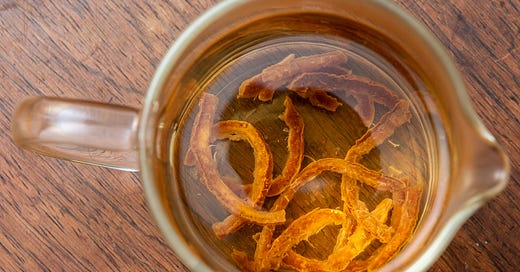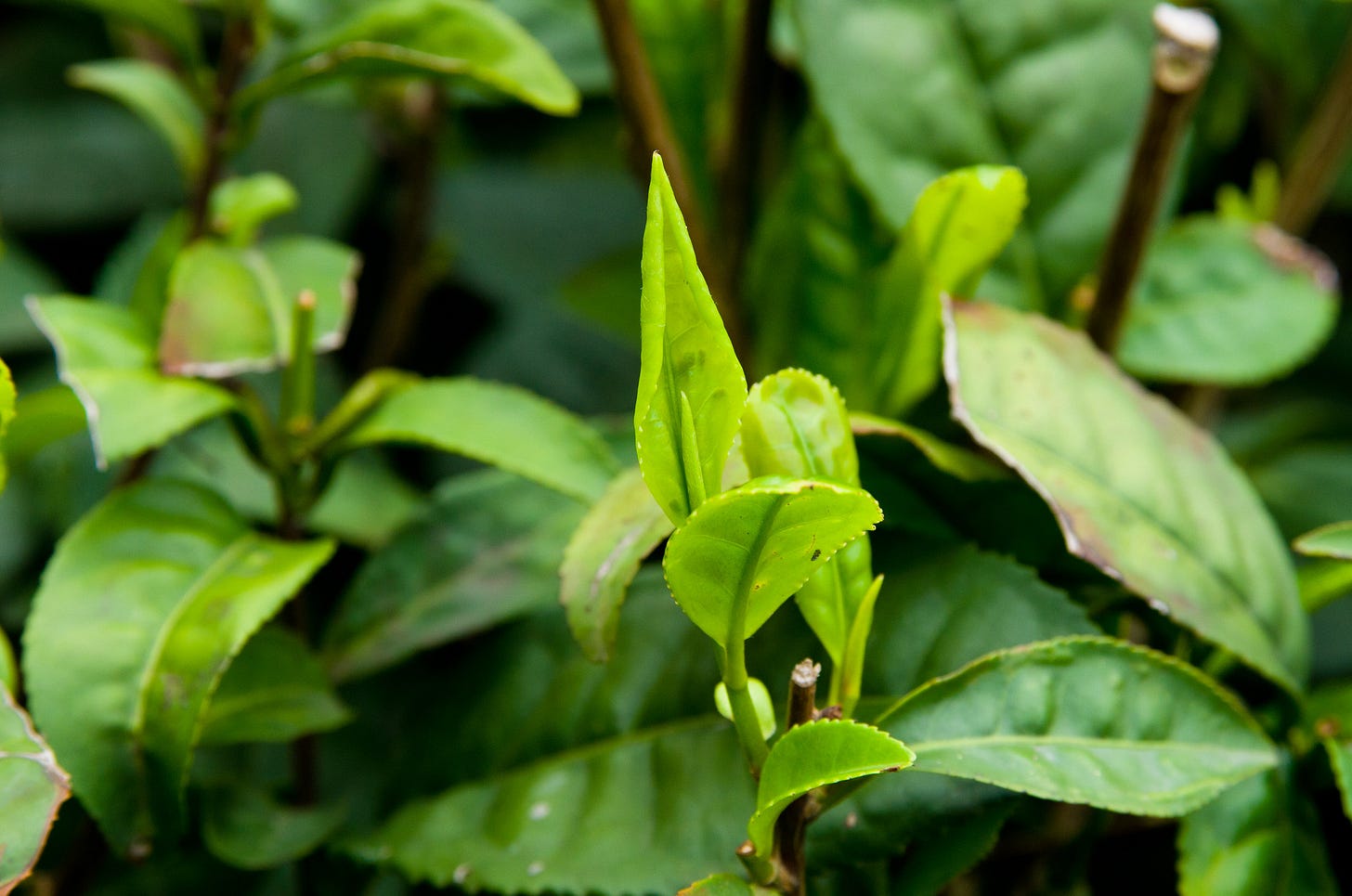High class citrus
The tea: 2022 Yuja peel, sold by Broken Cup Teahouse. $23 for 30g.
If you’ve ever ambled through a Korean supermarket, you’ve likely seen jars of a marmalade-looking citrus preserve hanging around the tea aisle. Spreading-on-scones aspirations aside, this syrup is actually made for dissolving in hot water to produce an aromatic citrus tea. It’s traditionally drunk as a soothing cold weather brew and is especially nice when you have a sore throat. The tea we’re talking about today is a premium version of yuja (yuzu) cha, inspired by a separate Chinese citrus decoction called chenpi. In China, special mandarin oranges are grown just for their peels, which are dried, aged, and added to tea (usually puer) as well as savory foods as a traditional medicine. The older the citrus peel, the more efficacious its health benefits, so says the people who make and sell it. High end aged chenpi can get enormously expensive, costing even more than the tea it’s steeped with.
Limes, lemons, grapefruits, and oranges are all hybrids of three primordial citrus species: citron, mandarin, and pomelo. Yuzu is one of the few varieties descended from the bumpy-skinned papeda, which is also the forbear of makrut and sudachi limes. What these papeda pals lack in juice they make up with a complex floral fragrance in their skins. The yuzu rinds we’re drinking today are exceptional. The batch currently on sale is from 2022; mine is from 2020 and has held up beautifully with no special storage. A tea made from them is silky on the lips and full of sweet, tart, and grapefruit-bitter flavors.
The source: Broken Cup Teahouse founder Yin Guan and I briefly worked together before she left to start her company in 2022. She specializes in small batches of excellent traditional Taiwanese and Chinese teas and I’ve loved everything I’ve tried. In addition to a retail presence around the Boston area, all her teas are available for nationwide shipping. Yin’s producer, Mr. Park, began making this yuzu peel as a homegrown Korean offering to complement the teas he imported from China. He wanted a fuller-tasting version of yuja cha minus the sugar, so he turned to chenpi for inspiration. The organically grown yuzu comes from Jeju island, a famed source for the fruit, and drying the peels takes six to 12 months, Yin says. Once a month or so, when the weather cooperates, the peels are laid out in a thin layer under the sun for a day or two. The process is repeated until they reach the right level of dry snappiness. Mr. Park first experimented with baking and dehydrating the peels, but found the extra heat turned them bitter and unsuitable for aging.
To brew: If you want to taste this yuzu on its own, 10 to 15 pieces make a good sized pot when steeped with boiling water. A 3 minute steep yields a light and sweet citrus accent; 5 to 10 minutes extracts greater twang and a pleasing bitterness. Cold brew is a good option, too, and Yin recommends carbonating it in a soda maker. You can also add a couple pieces of yuzu to your favorite tea. Green, white, black, and ripe puer are all good options.
Leafhopper is taking a break next week for the July 4th holiday. See you back on the 9th, and until then, stay hydrated!
How much caffeine is in your cup? It depends.
Caffeine may be a stimulant for humans, but for insects, it’s poison. That’s the reason tea, coffee, and cacao plants produce it, so as to protect young and tender growth from being munched on by passing bugs. I bring this up because all too often, caffeine-forming crops like tea and coffee are reduced to little more than stimulation delivery vehicles, as if growers are optimizing for high octane potency the way cannabis farmers maximize THC. The truth is that caffeine has little to do with us. Its effect on our bodies is an accident of nature.
As a writer and content marketer I’ve come across enough caffeine misinformation to make me jittery. This is my attempt to correct the record, so we can better understand caffeine’s role in the teas we drink every day.
Keep reading with a 7-day free trial
Subscribe to Leafhopper to keep reading this post and get 7 days of free access to the full post archives.








